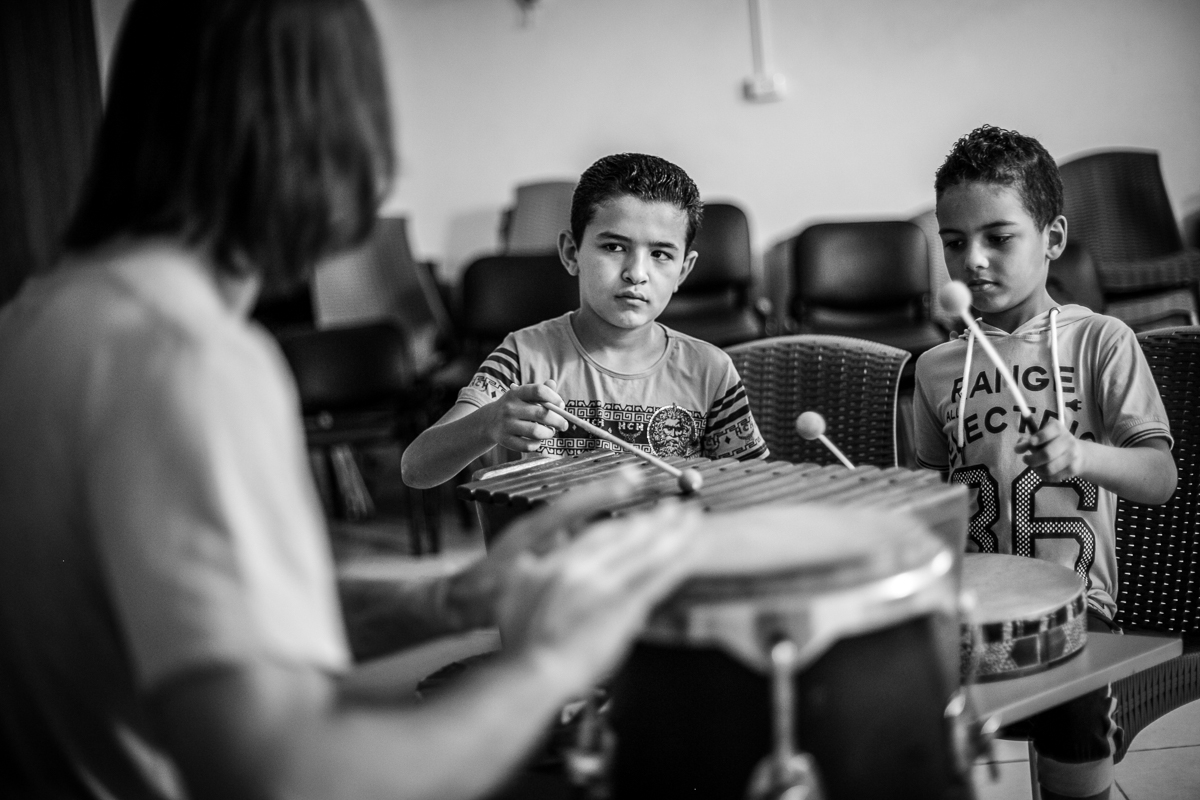Clinical Music therapy (MT)
Music therapy has been a major field in the development of music resources within the Palestinian refugee community of Lebanon carried out by Music & Resilience since the very beginning of the project.
The attention and determination of our local partner Beit Atfal Assumoud to develop clinical music therapy is a remarkable achievement, considering the contingent challenge that Lebanon at the time had no training program for this discipline, and the profession is virtually non-existent in the country.
Bearing witness directly from the Palestinian refugee community of Lebanon, former Assumoud employee Mohamad Orabi explained in 2020 the motivation behind this development (seminar discourse):
Assumoud was the first association to address mental health in the Palestinian refugee community, but in 2012, with five Family Guidance Clinics serving the majority of the camp locations, provision was nowhere sufficient to respond to the very long waiting lists. We were addressing many problems psychosocially, but this was not enough; we needed more resources.
M&R offered a framework in which to integrate music therapy into our mental health program; a team of psychologists, speech and motor therapists and social workers began training in psycho-dynamic improvisational music therapy, and subsequently treating children individually.
In 2013 the Syrian crisis caused the arrival of large numbers of traumatized Palestinian refugees from Syria in our already overcrowded camps. The training was adjusted to equip us to be able to work with short-term music therapy groups, treating children’s trauma from loss of family and experience of atrocious violence; many of the children treated were orphans. We were trained periodically by high-level professionals from Italy, UK, and Germany, who offered their expertise to the project.
In 2015 M&R received additional sponsorship(2) in order to fund formation to diploma level, in the Music Therapy School in Assisi (Italy) for two of Assumoud’s [now former] employees: myself, and Liliane Younes, Lebanese clinical psychologist and coordinator of mental health services for Assumoud. This training, completed in March 2019, not only equips us professionally, but it represents a significant empowerment for me and for my entire community.
Mohamad’s reference to the diploma reiterates not only the concept of promoting self-sufficiency in his community, but also significant exchange opportunities for fellow students in Assisi, who were able to learn about one of the world’s most notorious refugee communities.
Similarly, many European music therapy students (from Italy, France, Spain and UK) have participated in internships in Lebanon and several dedicated theses have been discussed in European universities. Fruitful exchange has resulted also for the European trainers involved in Lebanon, bringing them into contact with the generational trauma of “veteran” refugee communities, and with the raw trauma of “new” refugees from Syria. This learning has been immensely helpful in responding sensitively and appropriately to the newly arrived asylum-seekers of recent years in Europe.
The M&R music therapy team attends to research projects, with the objective of contributing scientifically to the body of knowledge pertaining to the psycho-social well-being of refugee communities. In 2021 the research team published a pilot research study titled Music therapy as a protection strategy against toxic stress for Palestinian refugee children in Lebanon on Approaches, an international peer-reviewed music therapy journal (see the Publications page).
The team also presents frequently at conferences, sharing experience with other health-profession colleagues around the world. Familiarity with music therapy has definitely increased in Lebanon, since Assumoud works with many Lebanese nationals as mental health specialists. An indication of this lies in the fact that interest is now being expressed by a private Lebanese university to establish the country’s first BA degree course in this subject.
Introducing music as a medium for mental health care within the Muslim community constitutes a significant challenge, since some interpretations of the creed consider music as a potential negative influence. The team responds by working hard to gain trust in the community, explaining the roots of musicality in human communication and therefore music’s power to repair neuropsychological, affective, and social difficulties.
A further challenge affecting sustainability lies in the instability of the workforce. Paradoxically, the 75 years’ “stagnation” of the Palestinian refugees is clearly evident in the waywardness of professional development, which can effectively lead nowhere. Changing jobs from association to association appears to be a coping strategy for people who can only move in this way, laterally. This results in continuously losing workers who have been partially trained, while starting from scratch with newly arrived staff.
As of 2024, Assumoud carries on the practice of music therapy through its own therapist who was not trained within M&R, while our project continues to give students in training as music therapists the opportunity to carry out part of their internship by participating in our summer activities. Part of this internship work allows the music-therapeutic evaluation of a group of Palestinian children, in order to better define further interventions for them.
Brief overview of the music therapy activities of Music and Resilience during 2018 and 2019.
Sections
- Music therapy graduation ceremony in Assisi
- Musical projects in which Assumoud is involved (part 1)
- Clinical music therapy sessions excerpts from an Assumoud Mental Health clinic
- Musical projects in which Assumoud is involved (part 2).
Adapted from the article Adjusting the pitch, section 4a (pp. 10-11).
Photos from the Reportage 2016 gallery, by Francesco Sonetti.




